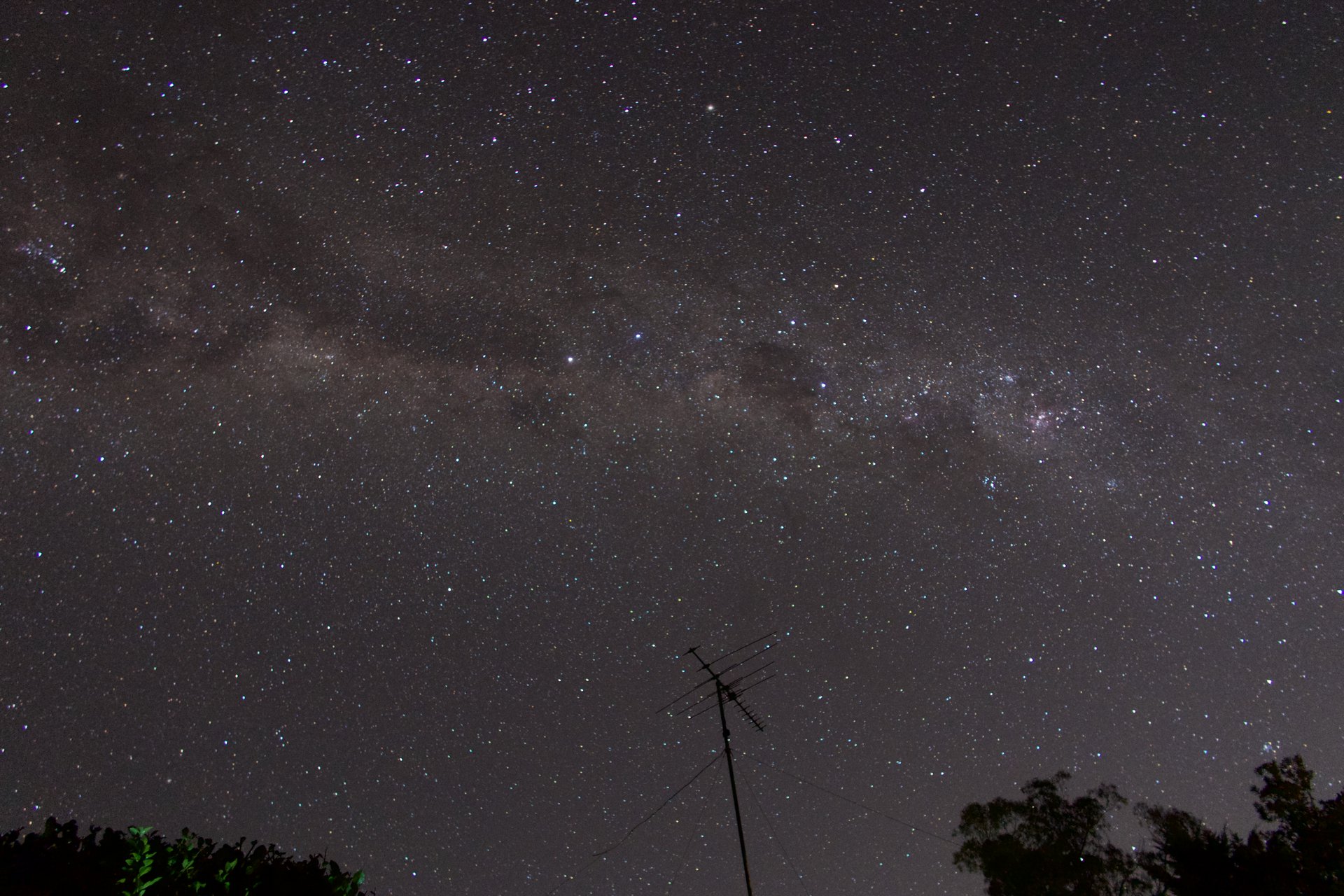We walk to the beach to escape the lights.
We pass the toilet block, the empty campsites, and the sign warning us of rips and currents. It grows darker and quieter. The beam from the torch gives us only disjointed glimpses of our surroundings. A twisted tea tree trunk. A wooden post. An escaped napkin.
When we find the path, Rowan switches off his torch. We follow the steps down through the coastal scrub. In the dim moonlight, the pale wooden edges of the steps look as though they are glowing. Still, we both somehow miss the final step and stumble, and Rowan switches the torch back on again.
At my university, I once attended a talk by a researcher who is blind. He said people sometimes ask if his hearing has improved since he lost his sight. His response is, ‘Would you expect someone’s eyesight to improve if they went deaf?’
Darkness – like blindness – doesn’t necessarily enhance our other senses. But it does make us more aware of them. Walking behind Rowan, further behind the beam of the torch, I am aware of things that I can’t see. I know that the track is sandy now. I can tell that I’m heading downhill. I finally notice the sound of the ocean, even though I could probably hear it all along.
As a kid, I was afraid of the dark. Or to be more accurate, I was afraid of wolves, and I thought wolves could be hiding in the darkness. I’ve always lived in Australia, so this obviously wasn’t a rational fear. But I think we tend to project stories onto darkness – and the tales I grew up with were full of wolves that ate children and grandmothers.
I pause to look up, while Rowan continues ahead. Australian nights aren’t full of wolves, but the darkness isn’t empty either. Tonight, the sky is crowded with stars. Compared to the pale specks that I see from Melbourne, these stars are stunningly crisp and clear. I can even see the silver shadow of the Milky Way, like a river arching overhead.

It feels strangely quiet. No insects or birds. Just my breath in the cold air and the hushed hissing of the ocean.
I think of my grandma. She loves the ocean; she misses being able to see it. I called her at the hospital earlier today, and when I said that Rowan and I were heading to Wilsons Promontory, she told me about the walks she used to do here. She is ninety-one and she has been around my entire life, but I’m still learning about her.
My grandma also told me that she was preparing to be moved to a palliative care unit. I didn’t know what to say. The conversation shifted back to beaches, wombats, and beautiful places. What do you say to someone who has maybe eight weeks left to live?
My grandma actually only has eight days left, but I don’t know this yet.
I am still thinking about my grandma when I step out onto the beach. I might not be afraid of wolves anymore, but I am apparently projecting other fears. For an eerie moment, I feel as though I have stepped off the edge of the world. I find myself thinking, ‘This is what death might look like.’
I can’t see where the ocean meets the sky, or where the water meets the sand. Instead, I am looking out into an open space all in shades of grey, like a misty desert. The stars are brighter than anything at my feet. The crescent moon is brighter still and it hangs low, big, almost yellow. The hills are black silhouettes to my left and right, so that it feels as though I am looking into a gateway. Rowan has switched off his torch again. As he walks further ahead, he begins to vanish into the grey landscape.
The ocean is loud and I can hear nothing else. I walk towards it, following Rowan, my feet sinking ankle-deep in the loose, dry sand. When the sand becomes flat, I sit down. I sit for a long time, looking towards the ocean that I can’t see. That my grandma might never see again. Then my face is in my hands, leaning against my knees, and Rowan is sitting next to me, asking if I’m okay. I think it’s the first thing either of us has said since we left the campsite.
When my breathing has steadied, I sit back up again and the stars are still there, and the grey sand, grey ocean, grey sky, all blended together into a strange emptiness. The moonlight casts shadows at our feet. There is something dreamlike about it all; like Rowan and I are sitting and talking at the end of the world.

A group of people come down onto the beach from behind us. They are laughing and loud, carrying a bright flashlight. The beam of the light swings back and forth across the sand, lighting our backs and the seaweed, and the spell is broken.
We walk again, away from the light and voices. We walk towards the hills and rather than the hills getting closer it looks as though they are rising until they swallow the moon. We find something small and glowing in the sand, like a luminescent grain of rice. It jumps away when Rowan reaches towards it. When I turn on my torch we can see that it is a shrimp, or something shrimp-like, now sandy-coloured and ordinary in the white light.
We see two shooting stars. We press our hands against a huge boulder encrusted with molluscs. We pass a smaller boulder on the way back to the campsite and I switch on my torch, suspicious. Rowan starts in surprise when the light reveals a wombat, only a few feet away. The wombat ignores us. Now that we know it is there, it seems incredibly noisy. The wombat continues to rip up the grass, chewing and shuffling, its fur now appearing so much warmer than stone.
As we draw closer to our campsite, the lights and sounds shift. Even from the beach, we could see the glow of the Tidal River campgrounds. Here, the glow is a glare – the glaring lights around the toilet blocks, casting shadows around the nearby trees and rubbish bins. Voices, the zipping of tents. The wheezing and thudding of a foot pump as someone inflates a mattress by the light of their headlights. An engine as someone moves their car. Laughter and music, growing louder and softer as we pass a campsite. Lights strung up on the outside of tents, some so bright that we squint and turn away.
Electric lights, music, laughter, people. Even on the darkest nights, when we think we see monsters in the shadows, these things can promise safety and comfort. Some of my happiest memories are of brightly lit evenings, shared with people I like. Nights when you feel connected, when music can tug at you in unexpected ways.
Tonight, though, the dark beach gave me something rarer. It gave me space. Lights and laughter can be comforting, but they also bring distractions. Sometimes you need to sit under the stars and let everything else fall away, leaving only you and the raw feelings that you project onto the darkness.
Tonight, the infinite grey night gave me space to feel what I needed to feel. Grief, regret, fear. Love.
Walking towards our campsite, I feel relief. Not relief at being back within the safe realm of human society, but relief at having been away from it.
Banner image courtesy of David Roker.


Leave a Reply